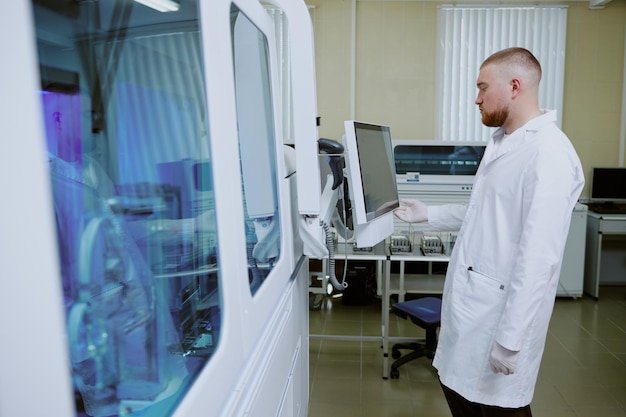Investing in Biotechnology: Gene Editing and Personalized Medicine Opportunities

Investing in biotechnology, particularly in areas like gene editing and personalized medicine, presents significant opportunities for investors looking to capitalize on innovative healthcare advancements.
The dynamic field of biotechnology is constantly evolving, offering groundbreaking advancements in gene editing and personalized medicine. For investors, understanding these breakthroughs is critical for identifying potential opportunities and navigating the complexities of the biotechnology market. This article delves into the exciting world of investing in biotechnology, focusing on the potential of gene editing and personalized medicine.
Biotechnology: A Primer for Investors
Biotechnology is the application of biological processes for industrial and other purposes, especially the genetic manipulation of microorganisms for the production of antibiotics, hormones, and other products. Understanding its scope is crucial for making informed investment decisions. For investors considering investing in biotechnology, it is crucial to grasp the fundamental science and technology driving innovation.
Understanding Biotech Sectors
The biotechnology industry encompasses a wide range of sectors, each with its unique characteristics and investment potential. Some key sectors include:
- Pharmaceutical Biotechnology: This sector focuses on the development and production of biopharmaceuticals, including vaccines, therapeutic proteins, and monoclonal antibodies.
- Agricultural Biotechnology: This sector involves the application of biotechnology to improve crop yields, enhance nutritional content, and develop pest-resistant plants.
- Industrial Biotechnology: This sector utilizes enzymes and microorganisms to produce a variety of industrial products, such as biofuels, bioplastics, and specialty chemicals.
- Diagnostic Biotechnology: This sector focuses on the development of diagnostic tests and tools for detecting diseases, monitoring patient health, and personalizing treatment decisions.
Understanding these sectors helps investors to diversify their portfolio and target specific areas of interest within the biotechnology industry. Each sector faces unique regulatory hurdles, market demands, and technological advancements, all of which impact investment strategies.
Biotechnology is a broad field, but understanding the specific sectors can help investors strategically approach the market. As technology continues to advance, the potential for growth and innovation remains significant, making it an attractive area for investment.
Gene Editing: Revolutionizing Healthcare
Gene editing technologies, such as CRISPR-Cas9, have revolutionized the field of biotechnology by enabling precise modifications to DNA sequences. This breakthrough has opened up new possibilities for treating genetic diseases and developing novel therapies. Gene editing provides powerful tools to target and modify specific genes within an organism’s DNA. It is a key focus for those investing in biotechnology.

CRISPR-Cas9: The Game Changer
CRISPR-Cas9 is a revolutionary gene-editing technology that allows scientists to precisely target and modify DNA sequences. Here’s why it’s a game changer:
- Precision: CRISPR-Cas9 offers unprecedented precision in gene editing, allowing scientists to target specific genes with minimal off-target effects.
- Efficiency: The technology is highly efficient, making it easier and faster to edit genes compared to previous methods.
- Versatility: CRISPR-Cas9 can be used to edit genes in a wide range of organisms, from bacteria to humans.
The precision, efficiency, and versatility of CRISPR-Cas9 have made it a game-changing technology in biotechnology, offering new hope for treating genetic diseases and advancing personalized medicine.
Gene editing, particularly with CRISPR-Cas9, offers immense potential for treating a wide range of genetic disorders. As the technology matures, the investment opportunities in this area are expected to grow.
Personalized Medicine: Tailoring Treatments
Personalized medicine, also known as precision medicine, involves tailoring medical treatment to the individual characteristics of each patient. This approach takes into account factors such as genetics, lifestyle, and environment to optimize treatment outcomes. This area is gaining traction for investors investing in biotechnology.
The Role of Genomics
Genomics plays a critical role in personalized medicine by providing insights into an individual’s genetic makeup. This information can be used to predict disease risk, diagnose diseases more accurately, and select the most effective treatment options.
Key applications of genomics in personalized medicine include:
- Pharmacogenomics: Identifying genetic variations that influence drug response, allowing for personalized drug selection and dosing.
- Genetic Screening: Identifying individuals at risk for specific diseases, enabling early intervention and prevention strategies.
- Cancer Genomics: Identifying genetic mutations that drive cancer growth, guiding the selection of targeted therapies.
Genomics is revolutionizing healthcare by enabling personalized treatment approaches that improve patient outcomes and reduce healthcare costs.
Personalized medicine is transforming healthcare by tailoring treatments to individual patient characteristics. As the field advances, investment opportunities are expected to expand, particularly in areas such as genomics, diagnostics, and targeted therapies.
Investment Strategies in Biotechnology
Investing in biotechnology requires a strategic approach to navigate the inherent risks and uncertainties associated with the industry. Diversification, due diligence, and a long-term perspective are essential for success. Investors investing in biotechnology should understand that the biotech industry can be volatile and highly regulated.
Diversification
Diversification is a key risk management strategy for investors in biotechnology. By spreading investments across multiple companies and sectors, investors can reduce their exposure to any single company or product failure.
Diversification strategies include:
- Investing in multiple biotechnology companies across different sectors.
- Investing in companies with diverse product pipelines and revenue streams.
- Investing in companies with different geographic locations and regulatory environments.
Diversification can help mitigate the risks associated with biotechnology investments and improve the likelihood of long-term success.
Diversification remains a cornerstone of successful biotechnology investing. By spreading investments across various companies and sectors, investors can mitigate risks and enhance their potential returns over the long term.
Regulatory Landscape and Ethical Considerations
The biotechnology industry is subject to extensive regulation by government agencies such as the Food and Drug Administration (FDA) in the United States and the European Medicines Agency (EMA) in Europe. Navigating this regulatory landscape is critical for companies seeking to bring new products to market. These regulations must be factored into any strategy for investing in biotechnology.

Ethical Considerations in Biotechnology
Biotechnology raises a number of ethical considerations, particularly in areas such as gene editing and personalized medicine. Investors should be aware of these ethical issues and consider them when making investment decisions.
Key ethical considerations include:
- The potential for unintended consequences of gene editing.
- The privacy and security of genetic information.
- The equitable access to personalized medicine technologies.
Addressing these ethical concerns is essential for ensuring that biotechnology is used responsibly and for the benefit of society.
The biotechnology sector is governed by a complex web of regulations and ethical considerations. Investors must understand these factors to make responsible and well-informed decisions in this dynamic and impactful industry.
Future Trends in Biotechnology Investment
Several emerging trends are expected to shape the future of biotechnology investment, including the increasing use of artificial intelligence (AI) and machine learning (ML), the rise of synthetic biology, and the development of new drug delivery systems. Staying informed about these trends is crucial for identifying future investment opportunities. Investors investing in biotechnology are increasingly focusing on these areas.
The Role of Artificial Intelligence
AI and ML are transforming the biotechnology industry by accelerating drug discovery, improving diagnostic accuracy, and personalizing treatment decisions. These technologies are being used to analyze large datasets, identify potential drug targets, and predict patient responses to therapy.
AI and ML are revolutionizing biotechnology by:
- Accelerating Drug Discovery: AI algorithms can analyze vast amounts of data to identify potential drug candidates and predict their efficacy.
- Improving Diagnostic Accuracy: ML models can analyze medical images and patient data to diagnose diseases more accurately and earlier.
- Personalizing Treatment Decisions: AI can be used to predict patient responses to therapy and tailor treatment plans to individual needs.
AI and ML are poised to drive significant advancements in biotechnology and create new investment opportunities in the years to come.
Biotechnology is on the cusp of a new era driven by technological advancements such as AI and synthetic biology. Investors who stay informed and adapt their strategies accordingly will be best positioned to capitalize on the exciting opportunities that lie ahead.
| Key Point | Brief Description |
|---|---|
| 🧬 Gene Editing | Revolutionizes healthcare with precise DNA modifications. |
| 💊 Personalized Medicine | Tailors treatments to individual patient characteristics. |
| 🛡️ Regulatory Landscape | Subject to extensive FDA and EMA regulations. |
| 🤖 Artificial Intelligence | Accelerates drug discovery and diagnostic accuracy. |
<
FAQ
▼
Key areas include gene editing, personalized medicine, drug discovery, and diagnostics. These fields offer high growth potential due to ongoing innovation.
▼
Biotech investing is high-risk due to regulatory hurdles, clinical trial failures, and competitive pressures. Diversification can mitigate these risks.
▼
Personalized medicine tailors medical treatment to individual patient characteristics like genetics, lifestyle, and environment for better outcomes.
▼
Gene editing offers potential cures for genetic diseases by precisely modifying DNA sequences, leading to innovative therapies and improved treatments.
▼
AI accelerates drug discovery, improves diagnostic accuracy, and personalizes treatment decisions by analyzing large datasets and predicting patient responses.
<
Conclusion
Investing in biotechnology offers significant opportunities for those willing to navigate its complexities. By understanding the potential of gene editing, personalized medicine, and emerging trends like AI, investors can position themselves for long-term success in this dynamic and impactful industry.





